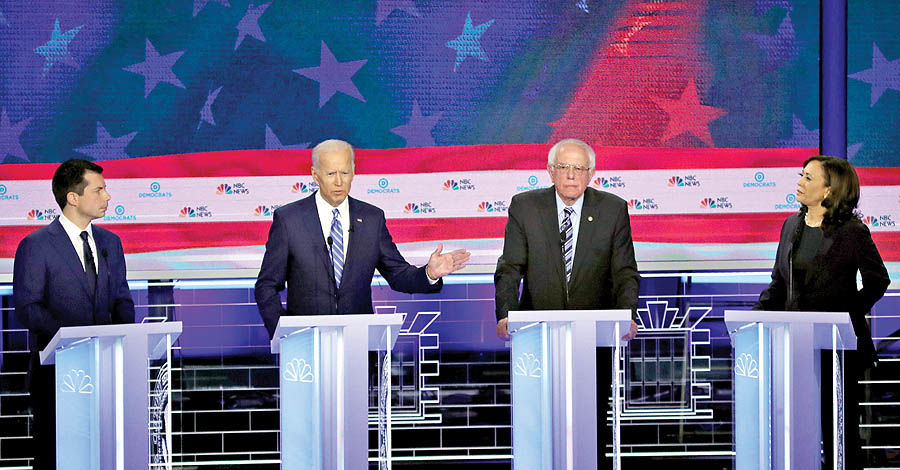The American presidential election campaign officially kicked off in mid-June by holding two televised debates between 20 Democratic candidates. During these two debates, it became clear that within the Democratic Party there are also serious differences regarding the economy, foreign policy, and social issues. But criticism of Donald Trump’s policies over the past two and a half years took most of the time of the candidates. In the area of foreign policy, the candidates paid most attention to Iran and the nuclear deal (Joint Comprehensive Plan of Action).
If we want to make a general classification concerning the perspective of Democrats and the Republicans about Donald Trump’s policies in relation to Iran and the JCPOA it is normal for the entire Republican Party to support Trump’s decision to withdraw from the JCPOA and exert maximum pressure on Iran. This is a decision accepted and supported by the entire Republican Party. Meanwhile, the Republicans also criticized the JCPOA during the administration of Barack Obama and resorted to all means to prevent its endorsement by Obama to no avail!
As for the Democratic Party, the general outlook is that Trump was wrong to pull out of the JCPOA and that his decision can lead to more risky behaviors. From their point of view, the United States must have remained in the JCPOA and should have put pressure on Iran in other areas in order to conduct negotiations in other fields.
Therefore, there are overall differences within both the Democratic and Republican parties; there are two groups within the Republican Party; the first group maintains that they should increase the pressures on Iran through diplomatic channels and in the meantime boost the sanctions. The other group, which is more extreme, includes people like Sen. Lindsey Graham, Tom Cotton, and Ted Cruz, who believe that if necessary, the United States should enter a military phase and even proceed until the regime change in Iran.
In terms of numbers, this group is in minority but maintain high political influence. But in general, the majority of the Republican Party believes that the United States should not enter into a military confrontation with Iran, and have warned Trump on numerous occasions in this regard.
There are also differences within the Democratic Party; the majority of the Democrats believe that the US must take a diplomatic path, return to the JCPOA and increase the pressure on Tehran in other areas. Few Democrats also believe that the maximum pressure policy or, if necessary, military action against Iran can be justified. People like Adam Schiff or Robert Menendez are in this group.
Among the presidential hopefuls, a few Democrats don’t want the United States to return to the JCPOA. But a wider spectrum and more prominent figures such as Joe Biden, Bernie Sanders, Kamala Harris, and Elizabeth Warren, who have the highest chances in the polls so far, have declared that if they win in the elections they will return to the JCPOA.
Of course, it should be borne in mind that the victory of a Democrat in the 2020 US elections would not guarantee the calm return of the United States to the JCPOA and even if a Democrat is elected he would set conditions to rejoin Iran Nuclear Deal. In fact, just as easily as Donald Trump pulled out of the JCPOA the next president cannot return to the JCPOA even if he wants and may set conditions for Iran, including in areas such as regional security or in issues related to Israel and have some demands from Tehran that may be rejected. Therefore, the same line pursued by Trump could continue even under a Democratic administration.
It should be noted that electoral campaigns in the United States are not heated yet; in the Republican campaign, the matter is clear, and whatever Trump says as president will reflect as the electoral space. In the Democratic Party, the issue of Iran is remarkable in the sense whether another war will take place in the Middle East, and to what extent could Trump’s actions drag the US to another war.
Therefore, in both the parties, the focus is on the issue of war, and especially the Democrats are worried lest the United States should enter into another war. Indeed, the JCPOA itself is not very important for the presidential candidates in the United States, and foreign policy issues matter where it affects the everyday lives of the Americans. What is important for the people of America is whether the foreign policy adopted by the ruling administration would help improve their livelihood or is it a deterrent factor in the way of their welfare. Of course, generally speaking, in the United States, foreign policy is not a matter followed by the masses but an issue for the elites. But if the issue of Iran is drawn to the military phase, it will certainly be taken into consideration and will have a negative impact on the votes for Trump. That is why the US president and his senior advisers keep emphasizing that they have no intention of waging a war against Iran. These statements, in fact, aim to ensure more votes for Donald Trump.










0 Comments